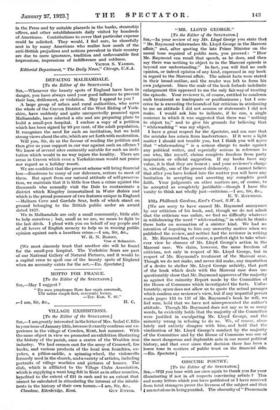affair," and, after quoting the late Prime Minister on the
moral tone required of public men, you proceed : " How Mr. Raymond can recall that speech, as he does, and then say there was nothing to object to in the Marconi episode is beyond our understanding." In fact, you will find no such opinion, or indeed opinion of any kind, expressed in my book in regard to the Marconi affair. The salient facts were stated- in their broad outline, and the reader was left to form his own judgment. Since the scale of the book forbade indefinite enlargement this appeared to me the only fair way of treating the episode. Your reviewer is, of course, entitled to condemn such treatment as inadequate or pusillanimous ; but I con- ceive he is exceeding the bounds of fair criticism in attributing to me an attitude I did not assume or statements I did not make. I would ask him to indicate, if he can, a single sentence in which it was suggested that there was " nothing to object to," and to give his grounds for believing that " whitewashing " was my object.
I have a great respect for the Spectator, and am sure that
the mistake has arisen from inadvertence. If it were a light matter I should not trouble you, but I think you will agree that " whitewashing " is a serious charge to make against any political writer, and especially serious in reference to one whop like myself, claims complete freedom from party inspiration or official suggestion. If my books have any value, it is that they are honest ; and your reviewer's charge is, virtually, one of the grossest dishonesty. I cannot believe that after you have looked into the matter you will have any hesitation in accepting and asserting my complete good faith. Your judgments on other matters are, of course, to be accepted as completely justifiable—though I have the vanity to think not wholly just—criticism.---I am, Sir, &c.,
E. T. RAYMOND.
102z. Philbeach Gardens, Earl's Court, S.W. 5.
[We are sorry to have caused Mr. Raymond annoyance by our criticism of his book, and, though we do not admit that the criticism was unfair, we find no difficulty whatever in withdrawing the word " whitewashing," in which he thinks there lurks an accusation of a sinister kind. We had no intention of imputing to him any unworthy motive when we published the review, and neither had the reviewer in writing it. Mr. Raymond has, of course, a perfect right to take what- ever view he chooses of Mr. Lloyd George's action in the Marconi case. We claim, however, the same freedom of criticism, not only in respect of Mr. Lloyd George, but in respect of Mr. Raymond's treatment of the Marconi case. Though we do not make, and never did make, any imputation of a desire to shelter Mr. Lloyd George unfairly, that part of the book which deals with the Marconi case does un- questionably show that Mr. Raymond approves of the majority as against the minority Report made by the Committee of the House of Commons which investigated the facts. Unfor- tunately, space does not allow us to quote the actual passages which confirm our reviewer's view, but if any impartial person reads pages 153 to 157 of Mr. Raymond's book he will, we feel sure, hold that we have not misrepresented the author's attitude. Though Mr. Raymond does not say so in so many words, he evidently holds that the majority of the Committee were justified in exculpating Mr. Lloyd George, and the minority wrong in refusing to do so. We, of course, abso- lutely and entirely disagree with him, and hold that the vindication of Mr. Lloyd George's conduct by the majority of the Committee and by the House of Commons was one of the most dangerous and deplorable acts in our recent political history, and that ever since that decision there has been a lower tone in matters of public trust on the financial side. —En. Spectator.]










































 Previous page
Previous page